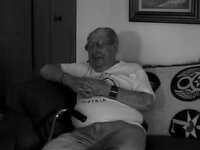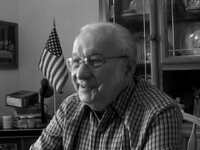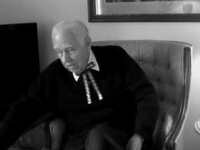Second World War - European Theater
Explore the Oral Histories from Ypsilanti area Veterans who served in the European Theatre
-
Davis, Robert Leach
Robert had just finished his second semester at U of M when he was drafted. He was living in Ann Arbor, but he was drafted from Vermont because his parents lived there. On June 22, 1943, a got on the train in VT and traveled to Fort Devens. Robert was very nervous because he had entered a completely new environment and wondered what was in store for him. He was sent to infantry basic training in South Carolina in July 1943 and was there for 13 weeks of training. After completing training, he was selected for the Army Specialized Training Program, which gave additional technical training to soldiers. Robert was sent to the University of Connecticut and enrolled in the basic engineering curriculum. He thought it was a poor choice because he was a liberal arts person, and he wasn’t sure that he would succeed. After six months, the program was scrapped anyway, and Robert was sent to the 78th Infantry Division in Virginia, in the spring of 1944. While in Virginia, he prepared to be sent to Germany. He was assigned to a heavy weapons company and was asked by the Motor Sergeant to drive a jeep for the squad. Robert said yes (it would get him out of all the marching!), and he was very glad that he was selected for this position. In September 1944, he was sent to Fort Dix, New Jersey where he boarded a troop ship. Robert landed in England about 10 days later (just a few months after D-Day). He was in England for a few months, getting equipment together, and by late November he crossed the channel, and landed in France. From France, he headed to Belgium and Germany. On Dec 13, 1944 he experienced his first day of combat. His 78th division was replacing another infantry division that had been in combat since D-Day, and the 78th division was just over the German border in Simmerath, a small farming community, when they experienced fierce fighting. He was not on the front lines. His job was to carry a trailer (behind his jeep) with a machine gun mounted on it. On the first day, he was ordered to carry ammunition up to a front-line post. As he was carrying them, a mortar landed nearby, and he caught a small bit of shrapnel in his arm and leg. When Robert arrived at the post, the aid man noticed that he had blood on his arm. Robert was told to go to the aid station to record the wound, receive treatment, and receive a purple heart. The doctors could not find the shrapnel in his arm, so he was sent to Paris for more treatment. He was away from the front for about 45 days. By the time he got back to his company in Germany, many of his comrades had been killed, captured, and wounded. Most of the company was made up of new people, strangers to him. His company had held the northern flank of the Battle of the Bulge, and he resumed his job as a jeep driver. In early March, his company moved south; they were the second infantry division to cross the Rhine River. They entered the Ruhr Valley in early April, within a few weeks of victory in Europe. Robert never fired a weapon in combat, since he was a driver. He thinks he was very fortunate to have fared so well, since he did not have to be at the front. Just after Victory in Europe day, his division came across a Prison camp (not a concentration camp, but a prison labor camp), and they liberated it. After the war ended, they ended up in a holding area, in central Germany and thought that they would be sent to the Pacific Theatre. Instead, his division was picked for occupation duty in Berlin. From October 1945 to March 1946, he was on occupation duty in Berlin with his division. Robert became a clerk for a few months, which he liked better than driving a jeep. In March 1946, he was discharged and sent home. He returned to VT, but his father had died while he was away. Robert worked that summer in Vermont, and then went back to Ann Arbor in September 1946, to finish at U of M with a degree in Psychology. -
Colley, Robert L.
Robert Colley was born in Petoskey, Michigan. He was drafted in November 1943, and went to Camp Blanding, just outside Jacksonville, Florida, to do his basic training. After completing basic training, he was granted 2 weeks leave. His next stop was just outside Boston to another camp. From there, Robert was shipped to England to replace troops who had participated in D-Day. He landed 9 days after D-Day, and was assigned to an armored division. While in Normandy, they were fighting in hedge rows, which were hedges used to help hold the soil. The division couldn’t make much headway because of the hedge rows, and it was only after about six weeks of fighting that they finally broke out of the hedgerows and made their way to Paris. Robert helped liberate Paris four months after his unit landed on European soil. He was captured in Aachen, Germany, when his unit was under the command of a new colonel. They fought their way into a valley, and when they got down there, a German tank was pointed down at them. Out of 139 men, 39 were captured, the rest were wounded or killed during the battle. Robert was taken to Camp 7A, and then transferred to Camp 12A. Eventually, he was brought into East Germany, where they were treated fairly well, although they never really got enough to eat. Most of his captors were soldiers who had been wounded on the western front, so now they served as guards. While at the camp, if they worked on a nearby farm, they were given more to eat, as a reward for working, by the farm owner. Robert worked as a harvester on a sugar beet farm at one point. During the winter of that year, he worked on the railroads, pounding stones underneath the ties to level the track. He could tell that the war was getting more intense, and that the Russians were making headway. From their location, POWs could see the supply trains, people, survivors from the Eastern Front increasing in number every day. There were many wounded coming in as well. A few months later, the POWs heard tanks and artillery getting more pronounced. The next morning, the Russians were outside their camp, sitting on their tanks. The POWs were liberated. Robert’s time as a POW had lasted for 8 months. Many Germans fled their farms as a result of the Russian advance, so he and his fellow POWs took a tractor, and headed for the western front. It took about a week to reach the western front. The POWs got to a river and Russian soldiers helped them cross, to get to the American side. There, the former POWs were directed to a camp, to sign in and give their serial number. They were then taken to Belgium and put on a boat back to the States. Afterwards, they were given a 60-day leave. Robert went down to Miami, and spent about a month there, before being sent to New York. He stayed for about three months in a camp, until an order came down to discharge any POWs, and Robert was discharged. He attended the University of Michigan under the GI bill, and graduated in 1949. Robert specialized in physical education, and he went on to become a stock trader in Ann Arbor. He married in 1950 and retired in 2002. He has two daughters. -

Clarke Jr., Benjamin
Benjamin Clark was born on November 11, 1919, in Fogo, Newfoundland. He enlisted in the Army Air Force following high school. After basic and advanced training, Benjamin was assigned to the 306th Squadron "Hells Angels" as a waist gunner on a B-17. After six missions, his plane was shot down and he became a POW. Of the ten crew members, only seven survived. After his capture by the Germans, he was taken to a Stalag 17-B where he spent more than two years. Since there were spies in the camps, he was especially careful to whom he spoke. After two years in camp, all prisoners were forced to walk 800 miles to the front lines, because the Germans were trying to avoid the Russians. General Patton rescued the prisoners and informed them that "...you guys are back in the U. S. Army." Mr. Clark was discharged on September 27, 1945 and returned to Dearborn, Michigan. -
Chase Jr., Frederick Corey
Mr. Chase was born in Ann Arbor, Michigan on February 17, 1922. He graduated from St. Thomas High School in Ann Arbor in 1941. He was drafted into the Army in November 1942, serving in the 409th Infantry, 103rd Division. Mr. Chase was deployed to the European Theater, arriving in Marseille, France. Mr. Chase saw action on many occasions and was ordered to the front line by his commanding officer. As they traveled north from France, they either slept on the ground or in foxholes. Winter time was difficult due to the cold weather. On occasion, they were able to stay in the homes of civilians. Since they could not speak their language, most communications were through hand jesters and smiles. Many of the homes were occupied by women and children only, as the men were off to the war. He was an anti-tank gunner who received the Bronze Star, the Combat Medal, a Good Conduct Medal, Infantry Badge, Victory Medal, American Campaign Medal, and the European AFR Mideast Medal. After his service in France, he moved on to Germany and Austria. Mr. Chase was honorably discharged as a PFC, in November 1945. Post service, Mr. Chase worked for 43 years at Michigan Bell, as a Local Testing Technician. He was also President of the local union chapter of the Communication Workers of America for 25 years, and a member of the Ann Arbor Chapter of the VFW. Mr. Chase was married (widowed) and had four children, seven grandchildren, and five great grandchildren. -

Brown, Charles W.
Charlie Brown entered the Service shortly after completing high school in Ann Arbor. He was working at the A&P at the time. After his Basic Training, he was sent overseas. It wasn't too long before he was involved in the Battle of the Bulge. There was a great deal of mud that the trucks that he worked with had to get through. Charlie and his group had to cut trees, so that the trucks could avoid it. There were no power saws, so everything was done by hand. At one point, Charlie was asked to drive one of the trucks, because the regular driver was not available. They hit a landmine and the truck was blown up. The two men next to him received shrapnel wounds. Three men in the back were blown out of the truck, and although they were bruised, they survived. Charlie received minor bruises. After taking a pounding from the Germans, his Colonel decided to surrender. The Colonel told the Unit that they had a choice. They could surrender to the Germans or try to find a way to escape. Charlie and a group of about 50 G.I. 's decided to try the latter. The 50 plus group spent a total of 4 days behind the German lines. During this time, the group tried to avoid detection. Charlie reported that one time he was so close to a German soldier who was looking for his buddy, that he could have tripped the German. Of course, he didn't. Another time, the exhausted group took a nap. One of the other soldiers woke Charlie, because they were in the middle of a German tank assembly area. For all 4 days, Charlie only had one candy bar to eat. When the group finally got back to the American lines, they all ate much better, but since they had not eaten for so long, the food did not stay with them. Charlie was still in Belgium when V-E Day was declared. Afterwards, they were packed up and prepared to go to the Pacific. Everyone was relieved when V-J Day was declared. He then started his trip home. While awaiting his discharge, Charlie was in Indiana, near enough to his relatives to visit. On one occasion he was taking a shortcut through a cemetery. There was an empty grave that he jumped into, to see how it felt. His cousin told him to get out. The gravestone was for CHARLE W. BROWN. He used the G.I. Bill to get an Associate’s Degree from Cleary College. He then went to work for the State of Michigan, and finally worked up to Assistant Business Manager at the local State Hospital. Charlie was married for 50 years before his wife died. His second wife was a widow after 40 years of marriage. They have been married for seven years. Charlie said that he has been married for 97 years. -
Bostic Sr., Edward Frank
Frank Bostic was born in Detroit, Michigan. His family moved to Ann Arbor when he was very young, and he attended the city’s high school. Frank played football and ran track (he was the first Black athlete to be voted captain). While going to school, Frank worked as a paper boy. He said he earned more than his father, who was employed by WPA. After high school he was drafted. He relates many instances of prejudice, including being assigned to sleeping in tents. He was told it was to prepare him for battle conditions; however, it was only the Black soldiers who slept in tents. Frank was eventually assigned to the 92nd Infantry, an all-Black unit. He fought in Italy and was seriously wounded. In spite of his wounds, Frank is credited with saving three other soldiers, for which he earned his Bronze Star. He spent nearly a year in hospitals before being discharged. When Frank returned from service, he tried to join the VFW. They refused him membership because he was Black. He eventually joined a different VFW. Frank married after the service and had six children: three boys and three girls. During his married life, he worked as many as three jobs to make sure his children received an education. His wife died just short of their 50th anniversary. -

Aroffo, Ernest G.
Ernest Aroffo attempted to enlist in 1942, but he didn’t weigh enough, and was turned away. He was drafted six months later in 1942. Ernest was sent to Fort Custer for training in October 1942 and stayed there for two years at the request of his superiors. In 1944, he was sent to Fort Sheridan for more training, and then to the field hospital group at Camp Grant in Illinois. His last stop in the US was in Raleigh, North Carolina, where he was promoted to 1st Sergeant of the 1st platoon. As 1st Sergeant of the 1st platoon, he had control of duties in the ranks. He and his others arrived at the Normandy beaches in October 1944 after D-day. Ernest later described his experience arriving on the beach after the battle. His mobile hospital unit was 29 men, with two nurses and two doctors. Their job was to work with the 3rd Army and keep up with them, and to perform medical services, mainly surgery. Ernest’s unit traveled with two jeeps, a two & one-half ton truck and an ambulance, while the 3rd Army was mostly a mechanized division. From France, they traveled through Belgium and Luxembourg, staying for about three days each. Eventually, his unit and the 3rd Army would enter Germany and visit cities like Metz and Nuremberg. The mobile unit mainly worked within cities, using ambulances to transport those in need of treatment (from the field and those within the cities). They were within 15 minutes of conflict, so they had access to the wounded. His unit later entered a concentration camp and was assigned to delouse the detainees. He described to listeners what he saw, including the barracks and the victims. Ernest’s last stop was Nuremberg. and he later described to listeners the two hospital buildings he worked in, and the patients he saw. While in Germany with the 3rd Army, he volunteered to rescue an injured man in a snow-covered minefield. He successfully brought this man back to the medical unit. Ernest was twice given a bronze star for his heroism. The first was from General Patton, who at the time was not a full 4-star General, and thus without the proper authority to award the star. So, a second General, who was a 4-star, awarded Ernest a second bronze star later. He kept a memorandum while overseas documenting the experiences he had. His old platoon now meets as a veteran’s group. -
Albert, Roy I.
(Newspaper Article from January 3, 1945): Roy Irving Albert, 20, only son of Mr. and Mrs. Roy Albert, 312 Saginaw, has been missing in action in Germany since December 12, his parents were told in a telegram from the War Department received yesterday noon. Overseas since September, he served as a gunner in an Infantry Division believed to be attached to the Third Army. His parents know that he participated in at least three battles prior to the one in which he was reported missing. In his last letter, dated Dec. 3, he wrote that he was living in a cellar in France, waiting to be sent out again. A graduate of Norway High, Albert was a pre-med student at the University of Michigan when he was inducted March 15, 1943. He received his basic training as a rifleman in the Infantry at Camp Roberts, California, following which, as the result of an aptitude test, he was selected to attend the University of New York as an engineering student in the ASTP program. During his training period in the states, Albert tried to get into the Air Corps. With this in mind, he dropped his studies as an ASTP student. After serving in various camps, he was notified last summer that his transfer into the Air Corps was approved. A month after he arrived at the Balden Air Base in Mississippi for his Air Corps training, the Aviation Cadets were discontinued, and he was sent back to the Infantry. He was last home on furlough in June. Albert's parents were notified in a letter written May 9, 1945 that he had been liberated and was safe in Germany.

